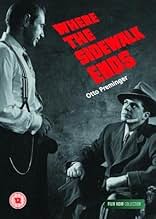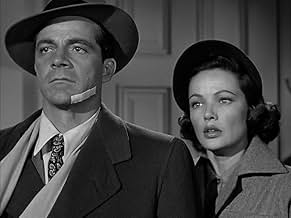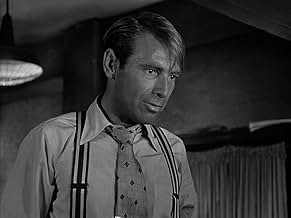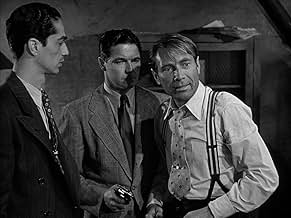CALIFICACIÓN DE IMDb
7.5/10
11 k
TU CALIFICACIÓN
El sargento Mark Dixon quiere ser algo que su padre no era: un tipo del lado correcto de la ley. ¿La naturaleza despiadada de Dixon se apoderará de él?El sargento Mark Dixon quiere ser algo que su padre no era: un tipo del lado correcto de la ley. ¿La naturaleza despiadada de Dixon se apoderará de él?El sargento Mark Dixon quiere ser algo que su padre no era: un tipo del lado correcto de la ley. ¿La naturaleza despiadada de Dixon se apoderará de él?
- Dirección
- Guionistas
- Elenco
- Premios
- 1 premio ganado en total
Fred Aldrich
- Detective at Staff Meeting
- (sin créditos)
Don Appell
- Willie Bender
- (sin créditos)
David Bauer
- Sid Kramer
- (sin créditos)
Eddie Borden
- Pool Hall Patron
- (sin créditos)
Neville Brand
- Steve
- (sin créditos)
Barry Brooks
- Thug
- (sin créditos)
Ralph Brooks
- Railroad Baggage Clerk
- (sin créditos)
Oleg Cassini
- Oleg
- (sin créditos)
John Close
- Hanson
- (sin créditos)
Opiniones destacadas
Despite the lack of a haunting theme song and the austere and humourous presence of Clifton Webb, this film is a much more exciting experience than "Laura", the other collaboration between Preminger, Andrews and Tierney. This is one of the grimmest film noir films I've ever seen, and not just in its lurid shadows and rain-drenched streets. The film is dark to its very soul. Dana Andrews plays what is now a standard stereotype: the cop who is bitter and deadly with his temper. But Andrews plays it with more honesty and humanity than most any other angry movie cop you're likely to see. Despite the fact that his character is good at heart, he is also a criminal and a killer, and the film beautifully strings him along, forcing him to serve his spiritual penance. What of course is most fun is the way that his terror over being discovered slowly comes to a boil. I've seen tons of film noir movies but I can't recall ever seeing the protagonist ever becoming the anti-hero in such a startling way. Many of the best film noir pics have that dizzying spiral theme of a man trapped by his own weakness. "Night in the City", "Detour", "Scarlet Street", "In a Lonely Place", "Act of Violence" and "Johnny Eager", are among the best of them. "Were the Sidewalk Ends" holds its own among them. Not a bad recommendation!
At first glance, it would seem natural to compare Where the Sidewalk Ends with Laura. Both have noirish qualities, both were directed by Otto Preminger, and both star Dana Andrews and Gene Tierney. But that's where most of the comparisons end. Laura dealt with posh, sophisticated people with means who just happen to find themselves mixed-up in a murder. Where the Sidewalk Ends is set in a completely different strata. These are people with barely two nickels to rub together who are more accustomed to seeing the underbelly of society than going to fancy dress parties. Where the Sidewalk ends is a gritty film filled with desperate people who solve their problems with their fists or some other weapon. Small-time hoods are a dime-a-dozen and cops routinely beat confessions out of the crooks. Getting caught-up in a murder investigation seems as natural as breathing.
While I haven't seen his entire body of work, based on what I have seen, Dana Andrews gives one of his best performances as the beat-down cop, Det. Sgt. Mark Dixon. He's the kind of cop who is used to roughing up the local hoods if it gets him information or a confession. One night, he goes too far and accidentally kills a man. He does his best to cover it up. But things get complicated when he falls for the dead man's wife, Morgan Taylor (Tierney), whose father becomes suspect number one in the murder case. As Morgan's father means the world to her, Dixon's got to do what he can to clear the old man without implicating himself.
Technically, Where the Sidewalk Ends is outstanding. Besides the terrific performance from Andrews, the movie features the always delightful Tierney. She has a quality that can make even the bleakest of moments seem brighter. The rest of the cast is just as solid with Tom Tully as the wrongly accused father being a real standout. Beyond the acting, the direction, sets, lighting, and cinematography are all top-notch. Overall, it's an amazingly well made film.
If I have one complaint (and admittedly it's a very, very minor quibble) it's that Tierney is almost too perfect for the role and her surroundings. It's a little difficult to believe that a woman like that could find herself mixed-up with some of these unsavory characters. It's not really her fault, it's just the way Tierney comes across. She seems a little too beautiful, polished, and delicate for the part. But, her gentle, kind, trusting nature add a sense of needed realism to her portrayal.
While I haven't seen his entire body of work, based on what I have seen, Dana Andrews gives one of his best performances as the beat-down cop, Det. Sgt. Mark Dixon. He's the kind of cop who is used to roughing up the local hoods if it gets him information or a confession. One night, he goes too far and accidentally kills a man. He does his best to cover it up. But things get complicated when he falls for the dead man's wife, Morgan Taylor (Tierney), whose father becomes suspect number one in the murder case. As Morgan's father means the world to her, Dixon's got to do what he can to clear the old man without implicating himself.
Technically, Where the Sidewalk Ends is outstanding. Besides the terrific performance from Andrews, the movie features the always delightful Tierney. She has a quality that can make even the bleakest of moments seem brighter. The rest of the cast is just as solid with Tom Tully as the wrongly accused father being a real standout. Beyond the acting, the direction, sets, lighting, and cinematography are all top-notch. Overall, it's an amazingly well made film.
If I have one complaint (and admittedly it's a very, very minor quibble) it's that Tierney is almost too perfect for the role and her surroundings. It's a little difficult to believe that a woman like that could find herself mixed-up with some of these unsavory characters. It's not really her fault, it's just the way Tierney comes across. She seems a little too beautiful, polished, and delicate for the part. But, her gentle, kind, trusting nature add a sense of needed realism to her portrayal.
An excellent opening title sequence starts this gritty Noir off in perfect step with what will follow. The son of a thief who was killed while attempting to shoot himself out of jail, Mark Dixon became a cop in an attempt to atone for the sins of the father, but cannot quite escape the fathers blood surging through his veins every time he strikes out at a hood, and it's his excessive use of force that gets him demoted with the threat of losing his job as detective, the only thing he ever wanted out of life. When he accidentally kills a witness to a murder, panic takes hold of him and he proceeds to cover up the evidence, but fate has a way of meting out cruel justice. Mark will fall in love for his victim's ex, and then her innocent uncle through another freak accident ends up taking the rap for the murder when the body turns up. And now the real moment of truth - atone for his own sins and free an innocent man, but probably lose the girl, or say nothing, keep the girl, but end up being just like his father? A brilliantly executed noir by Preminger and Dana Andrews nails one of the best performances of his career as the tormented detective.
We're a long way from LAURA. Once again Otto Preminger directs, Dana Andrews stars as a police detective named Mark, and Gene Tierney is the beautiful woman who haunts him, but nothing else about WHERE THE SIDEWALK ENDS resembles everyone's favorite sophisticated murder mystery. Instead of deliciously quotable dialogue we get gritty, harrowing realism. While the earlier film took place in the ritzy upper echelons of New York society, here we're in the low-rent district of dark streets, hoodlums, cheap restaurants and crummy flats. Tierney, gorgeous as ever, now works as a department-store mannequin and lives in Washington Heights (the neighborhood of the "doll" who once got a fox fur out of LAURA's Mark McPherson). This time Andrews is Mark Dixon, an older, sadder, more troubled version of the cool cop in a trench coat.
WHERE THE SIDEWALK ENDS belongs to a sub-genre of noir, movies about police brutality focusing on cops who can't control their violent impulses. Like Kirk Douglas's character in DETECTIVE STORY, Dixon owes his seething contempt for crooks to his father's criminal past. Where Douglas is self-righteous and blind to his own faults, Andrews is burdened by repressed guilt and self-loathing. He accidentally kills a suspect and covers up his actions with an attempt to throw suspicion on a slimy gangster (Gary Merrill) whom he has been vainly pursuing for years. Instead, a kindly cab driver is suspected because he's the father of the dead man's estranged and mistreated wife Morgan (Gene Tierney). Dixon, falling in love with the wife of the man he killed, tries desperately to save her father without giving himself away.
Among noir protagonists, Dana Andrews had this distinction: he was incapable of appearing unintelligent. Even when playing an average Joe, as he usually did, he always comes across as unusually sensitive and perceptive; more than that, his air of being too thoughtful for his own comfort gives him that haunted--and haunting--quality that was his essence as an actor. He played ordinary guys, cops and soldiers, but always with a tragic undercurrent of seeing and knowing too much. His conscientious heroes are marked by exhaustion, guilt, the inability ever to "lighten up." No other actor could have expressed so well the bottled-up anger, the slow-burning pain, the agonized intelligence of Mark Dixon. He also has a muted tenderness, a muffled warmth and even wry humor that make him heartbreaking. This comes out when he takes Morgan to a restaurant where he's a regular, and for the first time we see this cold, brutal man trading mock insults with the waitress, whose sarcasm can't hide her affection and concern for him. When Dixon asks his partner for money to get a lawyer for Morgan's father, he supplies it even though they recently argued and Dixon threw a punch at him. There are no words about loyalty or knowing he's a good guy deep down, but we see it all in the man's anguished silence and his wife's resignation as she hands over some jewelry to pawn. Dixon's goodness comes across through other people's reactions to him as much as through Andrews's deeply moving performance.
Though Dana Andrews was a minor star, he may be the quintessential forties man. He goes through some movies hardly ever taking off his overcoat; with that boxy, mid-century silhouette, further fortified by the fedora, the glass of bourbon, the cigarette he doesn't take out of his mouth when he talks, he looks imprisoned in the masculine ideal of toughness and impassivity. While many noirs romanticize the two-fisted tough guy, WHERE THE SIDEWALK ENDS offers an unflinching portrait of the reality behind the façade, a gripping and melancholy exploration of the roots and consequences of violence.
Andrews was sadly underrated in his own time (he was the only one of the three protagonists in THE BEST YEARS OF OUR LIVES not nominated for an Academy Award, though his low-key performance is far more compelling than Frederic March's hammy, Oscar-winning drunk). Fortunately, Andrews appeared in some films that ensured his immortality, and now at last this little-known film, which contains his best performance, can be seen as part of the marvelous Fox Film Noir set. This series, including a number of never before released titles (such as NIGHTMARE ALLEY and THIEVES' HIGHWAY), suggests that Twentieth-Century-Fox may have had the finest record of all the major studios when it came to film noir.
WHERE THE SIDEWALK ENDS belongs to a sub-genre of noir, movies about police brutality focusing on cops who can't control their violent impulses. Like Kirk Douglas's character in DETECTIVE STORY, Dixon owes his seething contempt for crooks to his father's criminal past. Where Douglas is self-righteous and blind to his own faults, Andrews is burdened by repressed guilt and self-loathing. He accidentally kills a suspect and covers up his actions with an attempt to throw suspicion on a slimy gangster (Gary Merrill) whom he has been vainly pursuing for years. Instead, a kindly cab driver is suspected because he's the father of the dead man's estranged and mistreated wife Morgan (Gene Tierney). Dixon, falling in love with the wife of the man he killed, tries desperately to save her father without giving himself away.
Among noir protagonists, Dana Andrews had this distinction: he was incapable of appearing unintelligent. Even when playing an average Joe, as he usually did, he always comes across as unusually sensitive and perceptive; more than that, his air of being too thoughtful for his own comfort gives him that haunted--and haunting--quality that was his essence as an actor. He played ordinary guys, cops and soldiers, but always with a tragic undercurrent of seeing and knowing too much. His conscientious heroes are marked by exhaustion, guilt, the inability ever to "lighten up." No other actor could have expressed so well the bottled-up anger, the slow-burning pain, the agonized intelligence of Mark Dixon. He also has a muted tenderness, a muffled warmth and even wry humor that make him heartbreaking. This comes out when he takes Morgan to a restaurant where he's a regular, and for the first time we see this cold, brutal man trading mock insults with the waitress, whose sarcasm can't hide her affection and concern for him. When Dixon asks his partner for money to get a lawyer for Morgan's father, he supplies it even though they recently argued and Dixon threw a punch at him. There are no words about loyalty or knowing he's a good guy deep down, but we see it all in the man's anguished silence and his wife's resignation as she hands over some jewelry to pawn. Dixon's goodness comes across through other people's reactions to him as much as through Andrews's deeply moving performance.
Though Dana Andrews was a minor star, he may be the quintessential forties man. He goes through some movies hardly ever taking off his overcoat; with that boxy, mid-century silhouette, further fortified by the fedora, the glass of bourbon, the cigarette he doesn't take out of his mouth when he talks, he looks imprisoned in the masculine ideal of toughness and impassivity. While many noirs romanticize the two-fisted tough guy, WHERE THE SIDEWALK ENDS offers an unflinching portrait of the reality behind the façade, a gripping and melancholy exploration of the roots and consequences of violence.
Andrews was sadly underrated in his own time (he was the only one of the three protagonists in THE BEST YEARS OF OUR LIVES not nominated for an Academy Award, though his low-key performance is far more compelling than Frederic March's hammy, Oscar-winning drunk). Fortunately, Andrews appeared in some films that ensured his immortality, and now at last this little-known film, which contains his best performance, can be seen as part of the marvelous Fox Film Noir set. This series, including a number of never before released titles (such as NIGHTMARE ALLEY and THIEVES' HIGHWAY), suggests that Twentieth-Century-Fox may have had the finest record of all the major studios when it came to film noir.
I'm a big fan of fan of film noir, and this film by Otto Preminger easily stands as one of the best that I've seen! Preminger has reunited two of his stars from the hit 'Laura' - Gene Tierney and Dana Andrews, for an entirely different sort of crime film. Laura was based around love, and this film is based around hate; as we watch police detective Mark Dixon, a copper already suffering scrutiny from his superiors for his heavy handed tactics, accidentally kill a suspect and try to pin the murder on a known criminal; a man by the name of Tommy Scalisi. The plot is brilliantly worked, and Preminger excellently balances several plot points; but it all comes back down to the main moral implication surrounding our main character. The fact that the film is set in the criminal underground means that the plot is given an excellent base to work from, and director Otto Preminger expertly captures the sleazier side of life by showing the main characters gambling, beating one another (and their women), shooting and more - and this also helps to offset the film from the earlier 'Laura', which was very much set in upper class society.
The role of Mark Dixon gives Dana Andrews one of the most interesting parts of his career. Here, we have a character that is difficult to like as he's so cold - but the fact that we can understand his motives ensures that he's easy to sympathise with, and that allows the audience the ability to plug into his plight. The character development is well timed, and as we've follows this character and his motivations throughout the film; everything makes sense by the end. His co-star is the beautiful Gene Tierney, who isn't given as much to do in this film as she was in Laura; a film that made Tierney its linchpin. She does well with what she's got, however, and the lead duo's chemistry is excellent and Tierney helps to complete every scene she's in. I can't say that this is a better film than the earlier Laura; that's a hard act to follow, but this film certainly fits into the film noir formula better than Preminger's earlier film. The film also makes a good comparison piece for Laura; as just about everything in this film is opposite to the 1944 movie, yet it's all strangely familiar. Highly recommended to all!
The role of Mark Dixon gives Dana Andrews one of the most interesting parts of his career. Here, we have a character that is difficult to like as he's so cold - but the fact that we can understand his motives ensures that he's easy to sympathise with, and that allows the audience the ability to plug into his plight. The character development is well timed, and as we've follows this character and his motivations throughout the film; everything makes sense by the end. His co-star is the beautiful Gene Tierney, who isn't given as much to do in this film as she was in Laura; a film that made Tierney its linchpin. She does well with what she's got, however, and the lead duo's chemistry is excellent and Tierney helps to complete every scene she's in. I can't say that this is a better film than the earlier Laura; that's a hard act to follow, but this film certainly fits into the film noir formula better than Preminger's earlier film. The film also makes a good comparison piece for Laura; as just about everything in this film is opposite to the 1944 movie, yet it's all strangely familiar. Highly recommended to all!
¿Sabías que…?
- TriviaThis is the last in a series of films that Otto Preminger made as a director-for-hire for Twentieth Century Fox in the 1940s. The series includes Laura (1944), which also stars Gene Tierney and Dana Andrews, ¿Ángel o diablo? (1945) and Torbellino (1950).
- ErroresWhen Dixon is staging the murder scene after Ken Paine' death, he is gloveless. A few seconds later he has gloves on both hands.
- Citas
[to Detective Dixon]
Insp. Nicholas Foley: Your job is to detect criminals, not to punish them.
- Créditos curiososThe opening credits start as chalk writing on a sidewalk with someone walking over them and whistling.
- ConexionesFeatured in Gene Tierney: Final Curtain for a Noir Icon (2008)
Selecciones populares
Inicia sesión para calificar y agrega a la lista de videos para obtener recomendaciones personalizadas
- How long is Where the Sidewalk Ends?Con tecnología de Alexa
Detalles
- Fecha de lanzamiento
- País de origen
- Idioma
- También se conoce como
- Where the Sidewalk Ends
- Locaciones de filmación
- 58 Pike Street, Manhattan, Nueva York, Nueva York, Estados Unidos(Ken Paine's apartment - between Madison and Monroe Streets - since demolished. Note Manhattan Bridge in the background)
- Productora
- Ver más créditos de la compañía en IMDbPro
Taquilla
- Presupuesto
- USD 1,475,000 (estimado)
- Tiempo de ejecución1 hora 35 minutos
- Color
- Relación de aspecto
- 1.37 : 1
Contribuir a esta página
Sugiere una edición o agrega el contenido que falta

Principales brechas de datos
By what name was Al borde del peligro (1950) officially released in India in English?
Responda

































